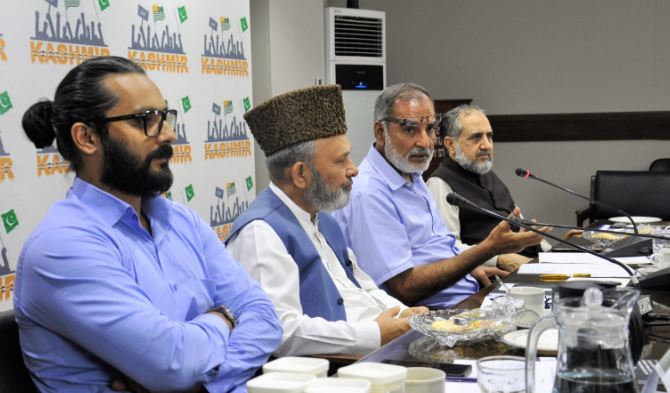DNA
Islamabad, Aug 5: Kashmir is now a civilizational project for India. India has started employing the apartheid element in the region, ensuring that the people of Kashmir are not given any power.The Kashmir issue has historically been one of occupation and settler colonialism, and not just a territorial dispute. Therefore, the struggle for Kashmir must at all times and levels be centered on the right to self-determination, which cannot be compromised in any way.
This was the consensus opinion during the 21st meeting of the IPS-Working Group on Kashmir and the launch of Legal Forum for Kashmir’s (LFK) report, ‘Article 370: Genesis, Abrogation, and its Ramifications for IIOJK,’ at the Institute of Policy Studies (IPS).
The session was addressed by Ghulam Mohammad Safi, Hurriyat leader, Khalid Rahman, chairman, IPS, Ambassador (r) Syed Abrar Hussain, vice chairman, IPS,, Advocate Nasir Qadri, executive director, LFK, Farzana Yaqoob, former AJ&K minister and general secretary IPS-WGK, and Prof. Dr Fakhr-ul-Islam, director research and academic outreach, IPS, among others.
Khalid Rahman underscored that the current situation demands that Pakistan should shape the narratives and awareness of the P5 states and international organizations to make them realize their role in this issue. As India propagates false assertions, these need to be countered with carefully crafted narratives and their wider dissemination through various mediums. Moreover, Pakistan, in its struggle for the Kashmir cause, has to maintain a consensus and fortify the case by drawing on the strength of Kashmiris and UN resolutions, which are the basic elements.
Mohammad Safi said that the Kashmir issue needs to be resolved with persistence and resilience. He emphasized the need for a consistent and cogent national policy towards Kashmir, notwithstanding the unfavorable international context, and the elimination of ambiguity in the Kashmir struggle. Although there are human rights violations, the struggle for the Kashmir cause must be centered on the right to Kashmiris’ self-determination.
Highlighting the report references, Ambassador Abrar apprised how the illegal annexation of Kashmir accompanied a new era of Indian brutality, human rights violations, imprisonments, communication lockdown, land grabbing, troop deployment, and demographic changes in IIoJK. For example, around 9,765 women have gone missing between 2019 to 2021, as acknowledged by Ajay Mishra, India’s minister of state for home affairs. Similarly, Mehbooba Mufti, former chief minister of IIOJK, has said that the revocation of Article 370 is a means to plunder Kashmir.
A serious development has been the reinstatement of a civil militia force in Kashmir to protect Hindus, as reported by the San Diego Union-Tribune in February 2023. The Indian government not only supports this militia financially but also has allowed them to keep arms.
Advocate Nasir elaborated that the de-operationalization of Articles 370 and 35A was unconstitutional for India, placing grave implications on the civil liberties of the people of IIOJK. Consequently, Kashmir has entered in a transitional phase of the settler colonial process pushed by India.
He emphasized that to counter Indian settler colonial motives, the Kashmir problem must be seen as one of occupation and settler colonialism, and not just a territorial dispute.
He said that the report methodically highlights the complexities of the reading down of Articles 370 and 35A and dispels their misinterpretation. It reviews different rulings of the Supreme Court of India and whether or not Article 370 might be repealed. Moreover, it highlights the implications and addresses the alleged temporary nature of Article 370.
In the age of narrative warfare, this ambiguity and the passive and complacent statements by national leaders have been unable to refute false Indian assertions, said Farzana Yaqoob. Contrary to the strong commitment and unwavering support of Pakistan to the Kashmir cause, this gives the impression that Pakistan is less concerned about the situation. On the Kashmir issue, sound policies and ongoing advocacy must not be compromised, she said.
These ramifications necessitate that Pakistan should present the Kashmir issue holistically and not in a partial dimension, said Dr Fakhr-ul-Islam. Otherwise, Islamabad would fail to exhibit the sensitivity of the situation and the significance of Kashmir’s cause. Moreover, Kashmir is beyond just an issue of human rights violations; it is an issue of the right to self-determination, which cannot be compromised in any way.

















